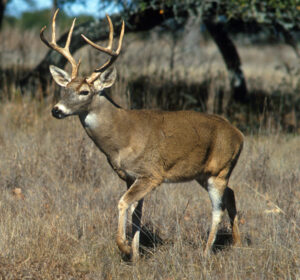Rising Deer Pop. & Rising Issues
By GuestBy Jared Penta, Canton’s Conservation Ranger
White-tailed Deer (Odocoileus virginianus) are a common and often welcome sight to see in the woods around town, or possibly in a yard or neighborhood. However, the population of these deer has been rising for many years now. As of February 2023, the state’s deer population was estimated to be over 150,000, which is about double what it was in the 1990s.
 The Massachusetts Division of Fisheries and Wildlife recommends a population density of around 10-20 deer per square mile. Canton lies in Mass Wildlife’s Wildlife Management Zone 11, which has been reported to have as many as 80 deer per square mile in some areas! Canton sits fairly close to that number at around 50 deer per square mile, and this can lead to some issues.
The Massachusetts Division of Fisheries and Wildlife recommends a population density of around 10-20 deer per square mile. Canton lies in Mass Wildlife’s Wildlife Management Zone 11, which has been reported to have as many as 80 deer per square mile in some areas! Canton sits fairly close to that number at around 50 deer per square mile, and this can lead to some issues.
Although deer are very rarely directly harmful or aggressive towards humans, they can still have adverse effects on the environment when in populations as big as they are around here. Ecologically, the main issue is the impact to biodiversity in our forests. Their main food source will get depleted, which already reduces biodiversity, and then the secondary food sources are next. These damaged ecosystems are then more susceptible to an invasive species entering and preventing native species from re-growing. Also, the damaged understory can impact many other species — especially rare or sensitive species — that live in that area by reducing the amount of shelter or food for them or even hindering pollination and reproduction.
Another major issue with the number of deer we have is the chances of getting Lyme disease. Deer ticks, also called black-legged ticks, can carry Lyme disease and other blood-borne diseases, and deer are their primary source of food. Deer contract Lyme disease from these ticks feeding on their blood, and they in turn can infect uninfected ticks that feed on them. More deer means an increased food source for ticks, which increases overall tick populations as well as the number of infected ticks. This makes it more likely for us to get bitten by a tick, and more likely that tick is carrying a disease.
The dense population of deer in our town can lead to more human/deer interactions that can have negative outcomes. Deer find their way into yards and eat or damage garden plants. More importantly, there is a greater risk of car accidents due to deer. According to MassDOT, in roughly the past year and a half (Jan. 2023 to July 2024), Canton has had 17 deer-related accidents. This is just one less than the four years prior to that combined (2019-2022). Seeing as we are just over halfway through 2024, having as many deer-related accidents as we do is concerning given that the deer population is still on the rise.
To address this issue, and hopefully curb any of these negative effects from increasing, the Canton Conservation Department is investigating new ways to do our part to manage the deer population and promote a healthier environment. Humans have largely removed or reduced the numbers of the natural predators of deer in this area, leaving mainly coyotes that hunt baby deer as the main predator. While Massachusetts does have black bears, they are not very common, and we are devoid of other predators of deer such as wolves and mountain lions. Coyote populations are hard to gauge, but regardless the deer population has kept rising, meaning humans are the only other main predator of deer that can control their population. Due to this, one of the possibilities being considered is to allow hunting in some of our conservation lands where currently hunting of any kind is prohibited.
My next submission will discuss what other conservation organizations in Massachusetts are doing to address the rising deer population, including Mass Audubon, the Trustees of Reservations, and state Department of Conservation and Recreation (DCR).
Short URL: https://www.thecantoncitizen.com/?p=126098










